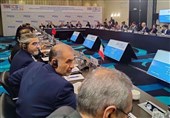Terror Attacks in Europe Likely to Rise: Brookings Senior Fellow
TEHRAN (Tasnim) – A senior fellow with the Transatlantic Program of the Istituto Affari Internazionali (IAI) said terrorist attacks in Europe by “European-born recruits who have fought in Syria or European-born recruits radicalized in Europe itself” will probably grow across the continent.
“Europe is indeed at growing risk of terrorist attacks. The reason is that years of sectarian tensions and civil conflict in North Africa and the Middle East, notably in Libya and Syria, have over time created the conditions for Takfiri groups to proliferate, gain in experience and resources and assets, and inspire or direct attacks in Europe either by European-born recruits who have fought in Syria or European-born recruits radicalized in Europe itself,” Riccardo Alcaro told the Tasnim News Agency.
Riccardo Alcaro was a nonresident fellow in the Center on the United States and Europe. He is an expert in transatlantic political and security relations with a focus on US-European cooperation in Europe’s neighboring regions, including the Middle East and North Africa, Iran and the Persian Gulf, the Sahel, Eastern Europe, and Russia.
Following is the full text of the interview:
Tasnim: Recently, the British security minister said that Daesh (ISIL or ISIS) militants have aspirations to launch chemical attacks on targets in Britain and elsewhere in Europe. In fact, European authorities fear that as the militant group was driven out of strongholds in the Middle East such as the Iraqi city of Mosul, their nationals fighting for the terrorist group would return home and pose a growing domestic threat. It seems that Europe is going to face an influx of Takfiri militants as a continent battered by a string of terror attacks. Why is that so? What would Europe do in order to contain this threat?
Alcaro: Europe is indeed at growing risk of terrorist attacks. The reason is that years of sectarian tensions and civil conflict in North Africa and the Middle East, notably in Libya and Syria, have over time created the conditions for Takfiri groups to proliferate, gain in experience and resources and assets, and inspire or direct attacks in Europe either by European-born recruits who have fought in Syria or European-born recruits radicalized in Europe itself.
What Europe can do is to increase intelligence cooperation and information sharing among EU member states but that will not make the terrorist wave stop.
Tasnim: Thousands of Europeans are thought to have traveled to Syria, many to join Daesh, since the outbreak of the foreign-backed war in that country. It sounds that chickens are coming home to roost. What do you think?
Alcaro: I wouldn't say that the chickens have come home to roost. Yes, European governments have failed to give sections of migrant communities prospects for integration, although it is somewhat inaccurate to put the blame on governments only, as individuals have their own stories and are ultimately responsible for their actions.
Tasnim: Reports suggest that certain European states have been supporting terrorist groups in the Middle East. Do you believe that they will finally reconsider their position on Syria and the rest of the region?
Alcaro: I know people in certain countries believe that the west is playing a double game and actually supports terrorist groups, but I haven't read a single credible report linking western support to Takfiri groups. It's true that in Syria it had become tricky if not impossible to distinguish between 'moderate' rebels and radicals, but that's exactly why US support for anti-Assad groups has been negligible so far.
Tasnim: It is no secret to anyone that the election of Donald Trump as next US president gave a big shock to the entire Europe. How would US-Europe ties change under Trump? Will Europe try to turn to other powers as a replacement for US?
Alcaro: With Trump, US-European relations will be much more complicated. It is possible that the relationship will become less of an alliance and more an opportunistic or pragmatic partnership. I anticipate problems ranging from relations with Russia, Israel-Palestine, and possibly Iran's nuclear deal.





